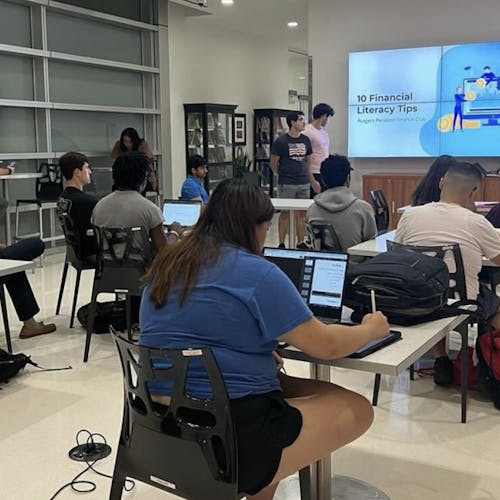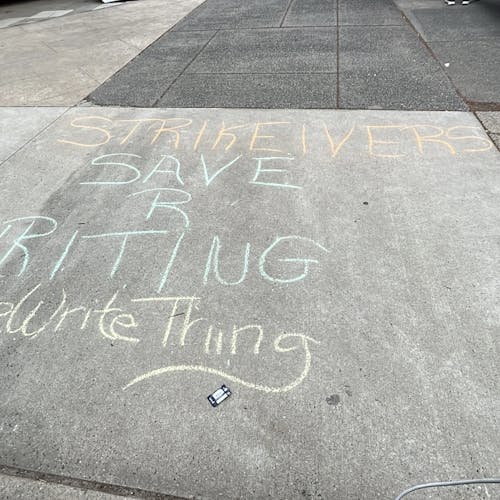Study finds energy drink consumption increases health risks

During finals week, students tired from pulling all-nighters swarm to each campus’ student center like bees to get that extra boost from their favorite energy drinks. But disturbing details have emerged about the science behind the popular, highly caffeinated beverages.
Studies show that college students are at risk for health issues stemming from excessive consumption of energy drinks.
Experts at the New Jersey Poison Information & Education System at Rutgers New Jersey Medical School in Newark believe energy drinks can be harmful to children and adolescents, said Bruce Ruck, NJPIES director of Drug Information and Professional Education.
The most endangered are frequent energy drink consumers, especially those who drink large quantities in a short time, he said.
“One of the big problems that we see with the energy drinks is that they are so high in caffeine, and students tend to drink a lot of them over a short period of time,” Ruck said. “One doesn’t work so they take two, two doesn’t work so they take three.”
Consuming too many energy drinks may make a person feel agitated, with a high heart rate, shaking, nausea and vomiting, he said.
“What often brings them in initially is the uncomfortable feeling in their chest,” Ruck said. “Their heart is beating very rapidly, and they get scared.”
People who use energy drinks should carefully consider what else they are eating and drinking, he said.
“Many do not realize that they’re drinking coffee at the same time,” Ruck said.
Snacks containing caffeine, such as chocolate, as well as certain medications, might increase health risks when paired with energy drinks. Alcohol and energy drinks are another hazardous combination because consumers become intoxicated while wide-awake.
“Their perceptions and fine motor skills are not going to be improved by the energy drinks. Any of the effects of the alcohol will still be there,” he said. “They may think they can drive, operate machinery, or study because they feel more awake, but in actuality they may not be able to.”
Concerns about the safety of energy drinks for minors are mirrored by recent announcements by other health organizations, Ruck said. In June, the American Medical Association announced its support of a ban on marketing energy drinks to people under the age of 18.
Banning companies from marketing to adolescents is a sensible action that can be taken to protect the health of children, according to AMA board member Alexander Ding in a statement.
Sivaram Cheruvu, a School of Arts and Sciences senior, said he still chooses energy drinks over coffee when he needs a boost.
“Coffee is addicting and costs much more than an energy drink. Plus, I prefer a cold, refreshing carbonated beverage,” he said. “I never drink more than one a day.”
He said he is skeptical of efforts to limit energy drink marketing. Popular coffee companies can market their beverages to children, and he said energy drink companies should be able to come up with their own solution.
“There are millions of people in this country that can’t move a muscle in the morning if they don’t have a cup of coffee,” Cheruvu said. “I think that’s a much bigger problem than the relatively few heavy energy drink people.”
Enticing energy drink companies to halt marketing efforts to younger generations is difficult because of the economic benefits of reaching the youth, said Shirley Smoyak, a professor in the Division of Continuing Studies at the Rutgers College of Nursing.
Her research concerns the health effects of high-energy drinks, and she said it is unlikely children will stop drinking them despite the warnings.
Students should exercise caution when using energy drinks, Smoyak said. The Food and Drug Administration has publicly acknowledged that they can cause adverse health effects and in some cases, people have died from drinking too many.
“The most common negative effects are in the cardiac system — tachycardia, arrhythmias, even death, with a family history,” Smoyak said. “Each liquid ounce of beverage has roughly 10 mg of caffeine. Cans of [high-energy drink] have upwards of 200 mg, because they have more per ounce.”
The Mayo Clinic’s website recommends healthy adults consume no more than 300 mg of caffeine per day.
“One can is probably okay with no cardiac family history,” Smoyak said.
Victoria Wagner, a School of Arts and Sciences senior, said she worries that the boost energy drinks provide does not outweigh their damaging consequences.
“Since caffeine is a drug, prolonged use could cause a person to need a dangerous amount to feel the same amount of energy with these products,” Wagner said.
College students also use energy drinks to avoid sleeping in order to be more productive, she said.
“Messing with your sleep schedule through the use of large amounts of caffeine is very dangerous, especially when this becomes a patterned behavior,” Wagner said. “It really worries me when I see people using energy drinks as a way to prevent sleeping in order to complete assignments.”



